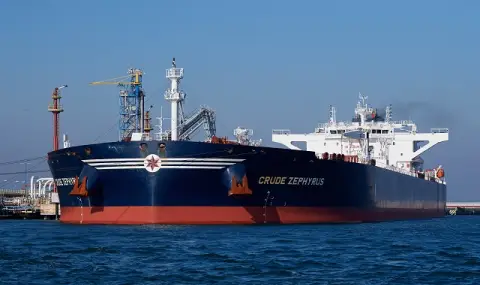Two incidents involving oil tankers off the island of Rügen occurred within days. The ships were sailing under the Panamanian flag - a very popular and highly controversial one in the shipping industry. Why is that?
Almost simultaneously with the rescue operation for the oil tanker "Eventin", another tanker, sailing from Russia, crashed off the coast of Rügen: the crew of the "Jazz" reported engine failure. According to news agencies, the crew resolved the problems themselves after a few hours. The "Jazz" is currently anchored off the town of Skagen in northern Denmark, where the "Eventin" is also due to be towed. For now, however, the tanker is not allowed to continue its journey on the orders of the German authorities.
Unlike the "Eventin", "Jazz" is not on the list of ships from the so-called Russian "shadow fleet" compiled by the environmental organization "Greenpeace" - about 190 old ships used by Russia to transport oil. Russia is believed to use tankers flying foreign flags to circumvent the international oil embargo imposed because of its aggressive war against Ukraine. However, the two ships have something in common: they fly the flag of Panama. But why is the flag of this Central American country so popular?
Registration is easy
One possible explanation is the ease of registration: Panama operates a so-called open registry. This means that any individual or legal entity can register a ship under the Panamanian flag - regardless of their nationality. There are also no restrictions on the number of registered ships.
The Central American country with 4.4 million inhabitants occupies a leading position in terms of the number of registered ships. According to data from the UN Conference on Trade and Development UNCTAD in 2023, about 16 percent of the world's merchant ships sailed under the Panamanian flag. And according to the online portal "The Maritime Executive" in 2023, the number of ships under the Panamanian flag reached 8,540, which puts Panama in first place in the world in this indicator.
"The" cheap" flag saves money and brings income
"Panama is a typical country with a cheap flag," explains Alexander Proelz, professor of international maritime law at the University of Hamburg. "These countries allow companies to register their ships for relatively low fees and then sail under their flag." In addition, this way certain standards in wages and stricter shipping rules are circumvented. On the other hand, for Panama itself, multiple registrations are a profitable business.
This problem has been known for decades, and not only since the beginning of the Russian war against Ukraine. But all attempts to solve it have failed so far, says Pröhls.
Because of the alcohol on board
Changing the flag, without changing the ownership structure, is a decades-old tradition in Panama. The first big wave began at the end of World War I.
During the prohibition regime in the United States, American ships were not allowed to serve alcohol on board, while under the Panamanian flag this was possible. It was at this time that the open register of ships was introduced, including to circumvent the higher wages and better working conditions prescribed by US law. Panama was the first to introduce the open register, followed by Honduras and Liberia. This practice experienced a particularly strong upsurge in the 1980s.
European countries have tried to counter this with offshore registries, which aim to offer better conditions to shipping companies. These are registries in areas belonging to larger countries, where the rules are not as strict and taxes are lower. However, the country in question retains administrative control over the territory in question, i.e. the flag under which the ships registered there fly.
The UN Convention on the Law of the Sea - a multilateral treaty often called the "constitution of the seas" - provides for the existence of a "real link" between the country and the ship flying its flag. A few years ago, however, the International Tribunal for the Law of the Sea clarified that this criterion does not limit a state's right to grant its flag to a ship - it is only intended to ensure that the state in question fulfills its obligations after it has granted its flag.
There are almost no possibilities for counteraction
In principle, neither sailing under a foreign flag nor traveling through certain waters can be prohibited. "A general ban on the sailing of suspicious tankers is not compatible with international maritime law," Pröhls explained to DW. But the EU could apply this to ships flying the Russian flag.
Meanwhile, the Panamanian shipping registry is at least trying to ensure safety. According to "The Maritime Executive", the Panamanian agency announced that in 2022, about 160 ships were removed from the registry. Their average age was said to be 17 years. Among the vessels removed were 78 vessels involved in undeclared and unregulated fishing.
